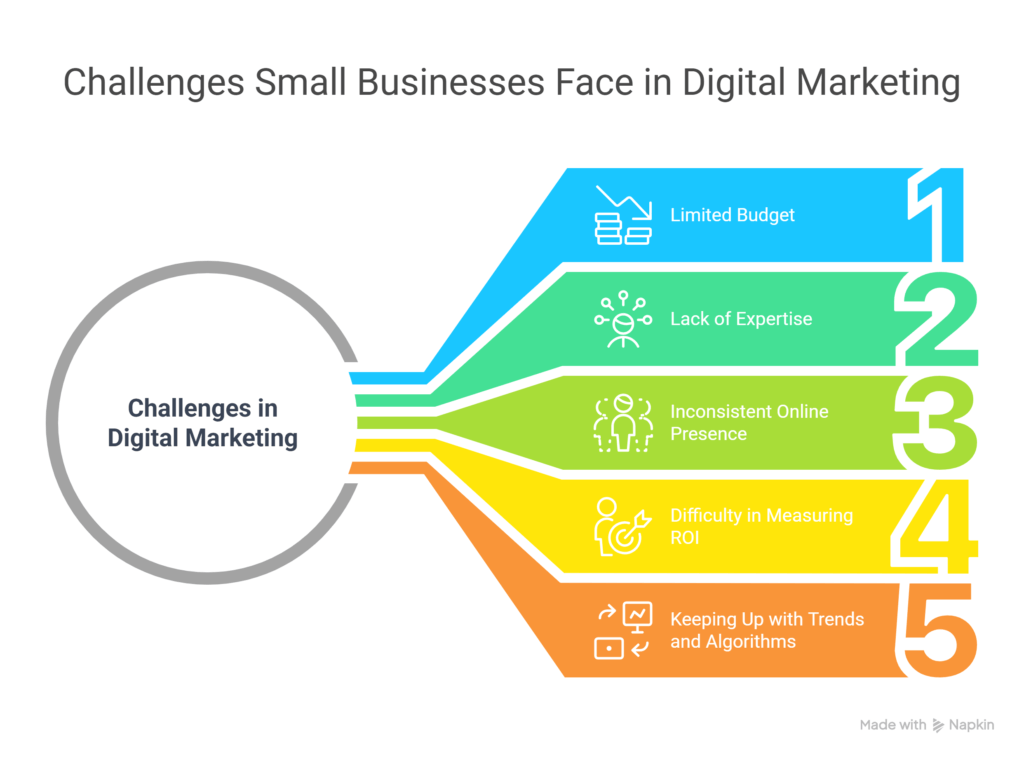Introduction: Need Digital Marketing for Small Business
In today’s fast-paced digital world, small businesses face unique challenges in staying competitive.This is where digital marketing for small business comes into play. By leveraging smart digital strategies, small businesses can achieve significant growth, boost their visibility, and create meaningful connections with their customers. In this blog, we will explain the importance of digital marketing and how it can benefit small businesses.
Do Small businesses need digital marketing?
Using online platforms and channels to advertise goods and services is known as digital marketing. For small businesses, it provides an affordable and scalable way to reach a larger audience, compete with bigger players, and drive sales. Whether through social media, search engines, or email, digital marketing for small business ensures that no opportunity is missed in connecting with potential customers.
Yes, they do! In today’s digital age, most customers search online before making a purchase — whether it’s a product, service, or even local shop. Digital marketing helps small businesses:
- Reach more people without spending big on traditional ads
- Build brand awareness through social media, SEO, and content
- Compete with larger companies using cost-effective online strategies
- Engage with customers directly and build long-term loyalty
- Drive sales and growth with targeted campaigns and insights
Even with a limited budget, small businesses can use digital marketing tools to grow smarter and faster.

Key reasons why digital marketing matters:
- It is cost-effective compared to traditional marketing.
- It enables precise targeting of specific demographics.
- It provides measurable results through analytics.
With customers, it establishes a direct channel of communication.
How Small Businesses Compete Fairly Through Digital Marketing
Digital marketing for small businesses gives them the tools they need to compete with larger companies on a more level playing field. Unlike traditional marketing, where big budgets often win, digital platforms offer affordable ways to reach the right audience. With strategies like SEO, social media marketing, email campaigns, and pay-per-click ads, small businesses can:
- Target specific customer groups with precision
- Showcase their unique brand personality and value
- Track performance in real-time and adjust campaigns
- Build strong online relationships with customers
- Gain visibility in search results alongside big brands
This allows small businesses to stand out, attract new customers, and grow—without needing a massive marketing budget.
Key Digital Marketing Strategies for Small Businesses
To harness the full potential of digital marketing for small business, here are the essential strategies every small business should implement:
- Search Engine Optimization (SEO): Increase your website’s exposure on search engines via search engine optimization
- Social Media Marketing (SMM): Build an active presence on platforms like Facebook, Instagram, and LinkedIn.
- Pay-Per-Click Advertising (PPC): Drive targeted traffic through paid ads.
- Content Marketing: Provide value to your audience through blogs, videos, and infographics.
- Email Marketing: Maintain strong relationships with your customers by sending personalized emails.
- Local SEO: Optimize your business for local searches to attract nearby customers.
Benefits of Digital Marketing for Small Businesses
The advantages of digital marketing are immense, and they directly address the needs of small businesses:
- Increased Visibility: Your business can be found by more people searching online.
- Cost-Effectiveness: Compared to traditional approaches, digital marketing offers a higher return on investment.
- Better Customer Targeting: Tools like Google Analytics help pinpoint the right audience.
- Measurable Results: Track your campaign’s success and refine your strategy.
- Brand Authority: Credibility and trust are increased by regular and excellent content.
How to Choose the Right Digital Marketing Approach for Your Small Business
Selecting the right digital marketing strategy depends on your goals, budget, and target audience. The following actions will help you make a decision:
- Define Your Objectives: Are you aiming for more website traffic, leads, or sales?
- Understand Your Audience: Learn about your audience by investigating the habits and inclinations of your clients.
- Set a Budget: Determine how much you can invest in digital marketing.
- Choose the Right Channels: Pick sites where your audience is most active.
- Monitor and Adjust: :Keep a close eye on your performance and make necessary adjustments to your tactics..
The Role of Social Media in Boosting Small Business Growth
Social media platforms are vital for small businesses looking to engage with customers and build their brand. Through creative content and active interaction, businesses can:
- Increase brand awareness.
- Drive website traffic.
- Boost sales through targeted ads.
- Gather customer feedback.
It might make all the difference to know where your audience is most engaged. Knowing where your audience is most active can make all the difference.
SEO and Small Businesses: Why Being Found Online is Crucial
In today’s digital-first world, if your business isn’t visible online, you’re missing out on valuable opportunities. Search Engine Optimization (SEO) helps small businesses appear in search results when potential customers look for products or services like theirs.
Here’s why SEO is crucial for small businesses:
- Increases online visibility – Helps your website show up on Google when people search for what you offer.
- Drives targeted traffic – Brings in visitors who are actively looking for your services.
- Builds trust and credibility – Higher rankings often mean more trust from customers.
- Offers long-term benefits – Unlike paid ads, SEO builds lasting organic traffic over time.
- Cost-effective growth – SEO provides a strong return on investment for small budgets.
By investing in SEO, small businesses can boost their online presence, compete with larger companies, and grow steadily over time.
How to Leverage PPC Advertising for Small Business Growth
One of the most effective ways to get results right now is through pay-per-click (PPC) advertising. Platforms such as Facebook Ads and Google Ads enable small businesses to:
- Target specific keywords and demographics.
- Control their budget by setting ad limits.
- Gain instant visibility and leads.
- For instance, a small bakery can use PPC to promote its special offers to local customers searching online
Email Marketing: Building Strong Relationships with Your Customers
One of the best strategies for establishing connections and keeping clients is still email marketing. By sending personalized messages, small businesses can:
- Inform clients about new deals and products.
- Build trust and loyalty.
- Encourage repeat purchases.
- Tools like Mailchimp and Constant Contact simplify the process of creating and managing email campaigns.
Challenges Small Businesses Face in Digital Marketing and How to Overcome Them
While digital marketing offers powerful opportunities, small businesses often face unique challenges when trying to build an online presence. These hurdles can slow growth—but with the right strategies, they can be overcome.
- Limited Budget
Challenge: Limited resources make it hard to match the ad spend of larger competitors.
Solution: Focus on organic marketing strategies like SEO, content creation, and social media to maximize impact with minimal cost. - Lack of Expertise
Challenge: Not knowing where to start or how to execute digital campaigns.
Solution: Invest in learning the basics or partner with a digital marketing agency. Many online resources and affordable courses are available for beginners. - Inconsistent Online Presence
Challenge: Posting irregularly or not having a clear brand message.
Solution: Create a content calendar, stick to a consistent tone, and engage regularly with your audience across platforms. - Difficulty in Measuring ROI
Challenge: Not knowing which efforts are actually working.
Solution: Use tools like Google Analytics, Facebook Insights, and UTM tracking to monitor performance and adjust your strategy accordingly. - Keeping Up with Trends and Algorithms
Challenge: Rapid changes in platforms and digital marketing trends.
Solution: Follow industry blogs, join marketing groups, and test new strategies gradually.
By understanding these common challenges and taking simple, strategic steps, small businesses can make the most of digital marketing and see real growth.

Case Studies: Small Businesses that Thrived with Digital Marketing
- Local Boutique: A small fashion store increased sales by 150% through targeted Instagram ads.
- Family-Owned Cafe: Improved local visibility by using Google My Business and local SEO.
- Handmade Crafts Business: Expanded customer base globally with an effective content marketing strategy.
The Future of Digital Marketing for Small Businesses
As technology continues to evolve, small businesses must adapt to stay competitive. Key trends to watch include:
- AI-Powered Marketing: Use AI tools to automate tasks and personalize customer experiences.
- Voice Search Optimization: Optimize content for voice search queries.
- Video Content: Focus on creating engaging video content for platforms like YouTube and TikTok.
- Interactive Content: Use quizzes, polls, and interactive posts to engage audiences.
Conclusion: Take Your Small Business to the Next Level with Smart Marketing
Small businesses must now use digital marketing; it is no longer an option. By adopting the right strategies, small businesses can overcome challenges, reach their target audience, and achieve unparalleled growth. Remember, success comes from consistency, creativity, and understanding your audience. It’s time to embrace the power of digital marketing for small business and take your business to new heights


